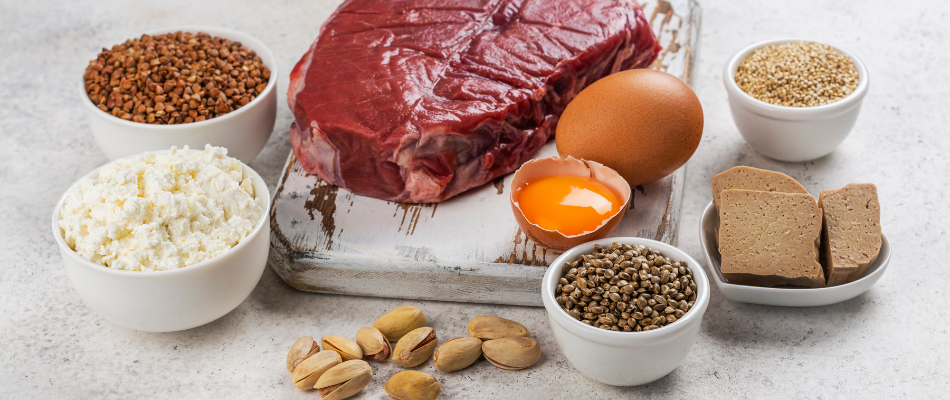In the previous article, we discussed the benefits of carbohydrates and we argued that it should be an essential element in our food intake as it provides energy. Even though eating carbohydrates has been questioned and debated amongst nutritionists and scholars alike, almost everyone agrees that protein is important.
But what happens in our bodies when we eat protein?
The body breaks down proteins into parts called amino acids. Amino acids are classified into three groups: essential, nonessential, and conditional amino acids. Essential amino acids cannot be produced by your body, and we need to supply this by eating protein-rich food. Nonessential amino acids are made by the body and conditional amino acids are needed in times of illness and stress.
 Every cell in the body contains protein. There are more than 10,000 types of protein in our bodies — from our organs to muscles and tissue, right through to our bones, skin, and hair. It is a critical part of the process to carry oxygen throughout our bodies (in the blood) and fuel our energy.
Every cell in the body contains protein. There are more than 10,000 types of protein in our bodies — from our organs to muscles and tissue, right through to our bones, skin, and hair. It is a critical part of the process to carry oxygen throughout our bodies (in the blood) and fuel our energy.
Protein helps repair and make new cells. For growing individuals, protein is essential for growth and development. It helps make antibodies that fight infections and illnesses and keeps cells healthy.
There should thus be no doubt that consuming protein is an essential food that we must consume daily. The amount of protein we should consume depends on many factors but, broadly put, 10–35% of your calorie intake per day should come from proteins — depending on your fitness routine, gender, and age. Sources of protein include nuts and seeds, legumes (beans, peas, or lentils), grains, tofu, and animal products (like meat, eggs, and dairy products).
The body needs 20 different amino acids to grow and function properly. Nine of these are essential (which means we need to consume them, remember) whilst the other 11 can be produced by the body functioning normally.
Let us have a look at these essential amino acids and what they do in your body. Now, bear with us, we will be using the scientific (nutritional) names of these amino acids. Continue reading through them, you will not have to remember their names. You must, however, realise the importance of these for your overall health and wellness. So here we go!
Phenylalanine
Phenylalanine produces neurotransmitters (tyrosine, dopamine, epinephrine, and norepinephrine). These transmitters play an integral role in producing other amino acids. Dopamine, for example, is involved with memory, motivation and regulating body movement.
Valine
Valine helps stimulate muscle growth and regeneration (healing injuries). It is also linked to energy production.
Threonine
This amino acid is essential for skin and connective tissue as it is a principal part of collagen and elastin. It also plays a part in fat metabolism and our immune function.
Tryptophan
Tryptophan is a frontrunner to serotonin — a neurotransmitter that regulates appetite, sleep, and mood. It is also needed to maintain proper nitrogen balance in the body.
Methionine
Methionine is necessary for tissue growth and helps the body with absorbing zinc and selenium. It is important in the process of detoxification and metabolism as well.
Leucine
This amino acid is critical in regulating blood sugar levels, regeneration, and produces growth hormones.
Isoleucine
Isoleucine assists the immune function of the body, helps regulate energy and aids in the production of haemoglobin (a protein that carries oxygen to the body and helps with the transportation of carbon dioxide from your organs and tissues back to your lungs).
Lysine
The function of lysine includes the absorption of calcium, the production of hormones and enzymes, collagen and elastin and assists the immune function of the body.
Histidine
Histidine is produced by histamine. Histamine is also a neurotransmitter and is vital for our immune response, digestion, and sleep-wake cycles. It also assists with maintaining the myelin sheath (a barrier that surrounds our nerve cells).
What is vital in the explanations of each of the amino acids is how critical each of these is for your health and wellness. There is thus no argument as to the importance of consuming protein. What we often do however is consume protein layered with fats which could cause long-term health risks. But more about fats in our next article.
Keep focused and remind yourself daily of your health goals. Even during this festive season, remind yourself of what your body deserves: to be the best version it can be! And with your body in top shape, you can live life to the full!
Read also:







